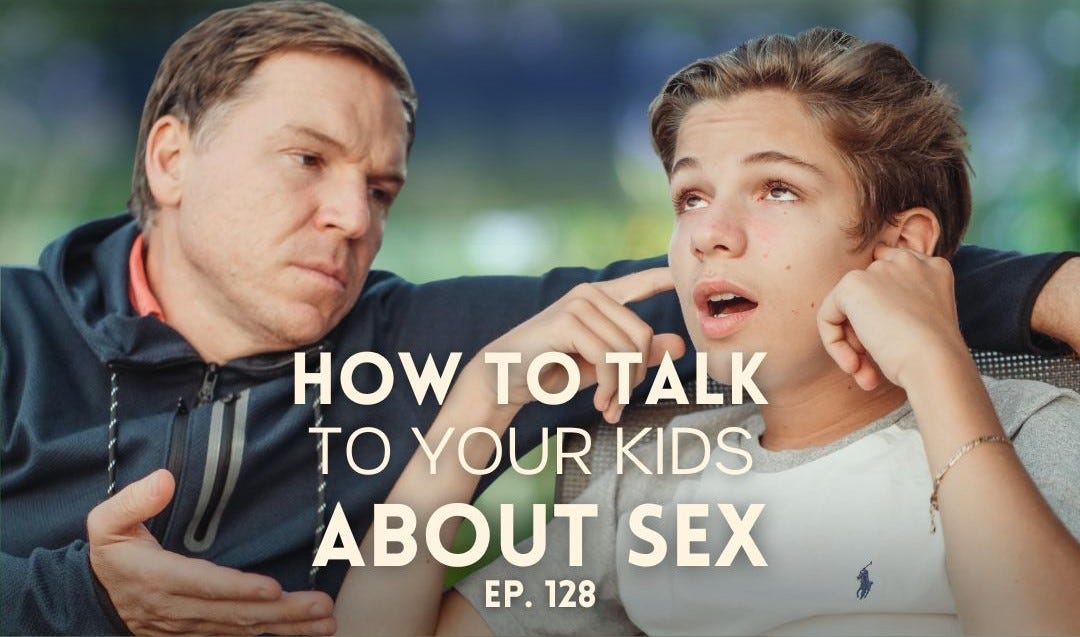How to Talk to Your Kids About Sex
It’s never too late to start
Afraid of having “the talk” with your kids? Even the most dedicated, intentional parents might feel their courage fail them when it comes time to introduce the birds and the bees.
In order to help you provide your child with a biblically-based foundation of sex and sexuality, as well as feel comfortable answering their questions, Austin sits down with Certified Health Specialist and sex educator Kristen Miele in this thoughtful episode of our ongoing series, Parenting in the Weeds.
Kristen shares insights on how parents, educators, and caregivers can talk to kids about sex and sexuality in a healthy, age-appropriate, and faith-informed way. Austin guides the conversation with curiosity and empathy, emphasizing that this topic is relevant not just to parents (and prospective parents!) but any educator who works with children.
This insightful conversation covers these topics and more:
Why it matters that sex is designed by God
How talking about sex doesn’t lead to increased sexual activity
Why “the talk” is an ongoing conversation, not a one-time conversation
How addressing your own brokenness will free you to talk with your child
Highlights from Austin’s Conversation with Kristen
The Gift of Sex
Even in the best of homes, kids often grow up with the uneasy feeling that sex is shameful or dirty. When families and churches avoid talking about it, kids internalize the idea that sex is bad or secretive.
If your family or church never talked about it, your only exposure to conversations about sex may have been through friends or the media, and you may have concluded that the topic of sex was sinful or evil.
Because you care about your kids, and because you care about the Lord, then you should care about sex because it is his creation. It is a good gift from him! Not just the physical act of sex and bearing children, but your sexuality. Your need for true companionship, true intimacy, true knowing, and being seen is meant to draw you closer to God and glorify him.
Your need for true companionship, true intimacy, true knowing, and being seen is meant to draw you closer to God and glorify him.
Obstacles to Overcome
You may have these doubts and fears about addressing sex openly with your child:
“Talking about sex will take away their innocence.”
“If I bring it up, they’ll want to do it.”
Research shows that talking to kids about sex does not increase their likelihood of sexual activity, and it doesn’t take away their innocence. What it does do is give kids a safe, trusted place to get information and ask questions – instead of turning to their friends, the media, or the internet.
God created us to have questions. The Bible is full of people questioning the God of the universe! As humans, we’re small and finite. But God allows us to eternally exist with him both now and in the future. And he allows us to question him.
If you don’t answer your kids’ questions – if you tell them, “Let’s talk about that later” or “You shouldn’t be talking about that”, they internalize the idea that their question was bad, that they are bad, and that the subject of sex is bad. They will grow up divorcing the subject of sex and sexuality from God.
Don’t Give Sex Ed to Our Culture
The sad truth is that children today are often exposed to pornography or explicit content as young as 10 years old, sometimes even earlier. Media and devices become their default “sex educators”.
While hearing about the widespread availability and influence of porn can make you want to hide under the covers, it is for such a time as this that you are meant to disciple and encourage and love your children. If they come to you and say, “I saw something”, thank them for trusting you with that. Stay calm. Avoid shame. Validate their feelings. Use it as a teachable moment.
Even at a very young age, you can explain to your child that bad pictures are pictures of people who are naked or videos of people who are naked, which is inappropriate and disrespectful. That’s not how to care for and love other people. They can understand that no one should ever take pictures or videos of them.
It can be hard to cope with the reality of that kind of early education, but it’s better to be safe than sorry – and to focus on prevention rather than reaction.
Age-Appropriate Topics and Information
Talking to your kids about sex does mean thinking about their developmental stages:
Ages 3–6: Focus on body safety, healthy boundaries, and correct terminology.
Ages 7–10: Add topics like puberty, reproduction, sexting, and peer pressure.
Middle School: Include gender identity, LGBTQ+ questions, and emotional/relational aspects of sexuality.
High School: Talk about media influence, consent, relationships, and decision-making. You become more of a consultant than a commander.
Feeling ill-equipped to address these topics and offer correct information? It’s very possible that you didn’t receive an accurate, God-centered sex education for yourself. Kristen’s curriculum is designed to give you the information, terminology, and content that you need to talk to your child.
Healing and Redemption
If you have a background of personal sexual brokenness, seek healing through counseling and pastoral support so that your own trauma doesn’t affect your ability to answer your child’s questions. Talking to kids about sex can even strengthen marital intimacy through honest conversation.
It’s never too late to start openly communicating with your kids about sex. Be honest— and use age-appropriate truth, not euphemisms, myths, or metaphors. Lean into the awkwardness instead of avoiding it. And stay curious – you might learn some new things too! Above all, rely on the Holy Spirit to guide you. God’s design for sex is beautiful and holy, and he wants to redeem the topic of sex and sexuality for both you and your kids.
Recommended Resources:
SexEdReclaimed - Kristen’s resources and curriculum, including free samples and practical tools
The Sex Talk You Never Got - Sam Jolman talks with us about rethinking sexuality in the light of God’s design



